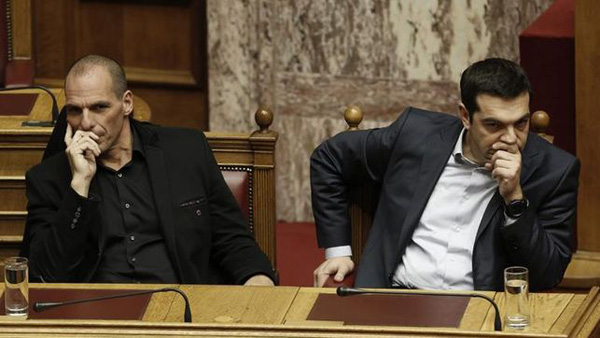
The Tsipras’ government has soon discovered what sharing sovereignty means in the Eurozone, especially in a country being rescued by “the institutions” (we no longer call them the Troika). Many comments, especially from outside Greece (but even from Syriza’s more leftist factions) consider that the concessions made by the new government mean it is backtracking on its many election promises. And so it is. But at the same time this has allowed the executive some leeway. The Greeks have understood it well: despite the backtracking and the odd demonstration, a large majority of Greeks (compared with 36.3% in the elections) support the new government, while a majority are also in favour of staying in the euro because, for them, if inside it is raining, outside it is pouring. Those who have suffered the most know that, even if only a little, their situation will improve and that the old big parties (PASOK and New Democracy, which ruled the country since the end of the dictatorship) are not only largely responsible for what has happened but have failed to tackle corruption and make the richest –indeed, all– pay taxes as they should.
Negotiations are forging ahead, are tough and their results uncertain. Tsipras has made a significant political mistake accusing Spain and Portugal of conspiring against him. So where does that leave the South in Europe? The letter sent by Minister Varoufakis to the Chairman of the Eurogroup contains a list of reforms to undertake and policies to implement, some of them highly generic and none quantified in any way. And that is what is to be negotiated in the coming weeks: numbers (and a few other things). The government, assailed by a possible suspension of payments and seeking a further solvency breather (for four months), has backtracked on issues such as stopping or reversing privatisations that are already in progress and meeting budgetary targets. But it has also adopted some of the measures of the ‘Thessaloniki Plan’ to confront the humanitarian crisis by addressing the lack of food and housing, providing universal access to public health and energy for those who suffer the most. Of course, while avoiding a negative fiscal effect.
Although tax collection is currently €17 billion short, the Greek government is seeking to find some elbow room by combating fraud and, in the short term, by reviewing the budget’s primary surplus (ie, before the payment of debt interest) that Greece has committed to meet –4.5% of GDP–, but which will be extremely difficult and costly to achieve and sustain. The Tsipras government would like to reduce it to 1.5%. There is certainly some scope for negotiating, as Paul Krugman has well understood. And Tsipras could also get a respite from the 2.5% GDP growth envisaged by the Commission for this year, despite the poor last quarter. If so, the government could take advantage of the margin to promote new policies. In fact, the Eurogroup and the European Commission are now recognising that a change in the majority in an election can lead to some fine-tuning in economic and social policy, as long as common rules are respected, macroeconomic parameters preserved, debt payments assured and structural reforms implemented. Hence, Greece will be allowed a certain degree of flexibility. If the negotiations have so far led to a greater pragmatism in the Tsipras government, making it jettison some of the more radical left-wing items of its agenda, this has not necessarily implied a return to the status quo ante.
At the same time, many in the Eurogroup cannot but hope that the Tsipras government will finally carry out the basic reforms needed by Greece, since it lacks an effective tax collection system and even a property register, among other shortcomings, besides being immersed in a sea of corruption. And despite this, the country was admitted to the monetary union. Nevertheless, Syriza might not be immune from being a prey to corruption. But if Tsipras fails to reform, who will? This is now well understood in the Eurogroup: there is no alternative in Greece to Tsipras and Syriza. The socialist Pasok has practically vanished into thin air and the conservative New Democracy was unable to push through reforms. The technocrats failed to deliver in 2011. The neo-Nazi Golden Dawn, currently the third largest party in parliament, must not be allowed to become the alternative.
Many are looking to Greece, especially the European radical left (such as Podemos in Spain). Many social-democrats in the Eurozone are also seeking to create an alternative policy to strict austerity but it has so far failed to materialise (Germany’s influential SPD, in coalition with Angela Merkel, has so far made no effort). Meanwhile, the conservatives are not willing to see their policies de-legitimised. Nevertheless, uncompromising austerity is on the wane, but not from any pressure exerted by Hollande or Renzi: it has been Merkel, as shown by her agreement on wage rises with the metal trade union; Draghi at the ECB, whose bond purchase programme has started this week; an IMF that has been highly critical with the policies so far implemented; and the European Commission itself, whose investment plan carries the name of its chairman, the social-christian Juncker. The Commission is now keener on having its member states implementing structural reforms than on meeting strict deficit and debt targets, as reflected in the leniency with which it is reacting to the breaches by France, Italy and others. In Spain cuts are now being slowed down. Although austerity is already graven in stone in the constitutions of several Euro member states, in the Treaty on Stability of March 2012 –also known as the Fiscal Compact– and in subsequent national laws.


